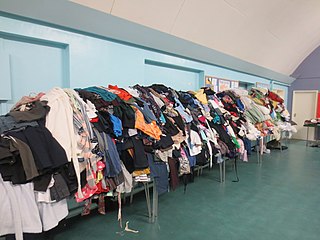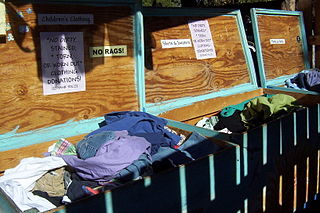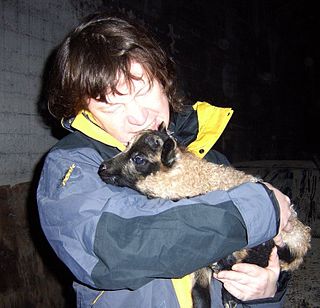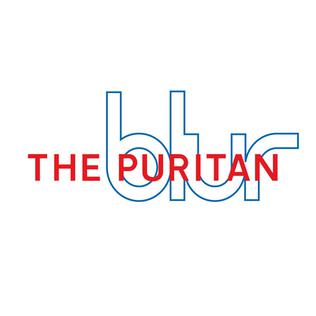This page is based on this
Wikipedia article Text is available under the
CC BY-SA 4.0 license; additional terms may apply.
Images, videos and audio are available under their respective licenses.

Overconsumption is a situation where resource use has outpaced the sustainable capacity of the ecosystem. A prolonged pattern of overconsumption leads to environmental degradation and the eventual loss of resource bases.

Give-away shops, swap shops, freeshops, or free stores are stores where all goods are free. They are similar to charity shops, with mostly second-hand items—only everything is available at no cost. Whether it is a book, a piece of furniture, a garment or a household item, it is all freely given away, although some operate a one-in, one-out–type policy.

Car boot sales or boot fairs are a form of market in which private individuals come together to sell household and garden goods. They are popular in the United Kingdom, where they are often referred to simply as 'car boots'.
The FreeSharing Network was an international free recycling network that redistributes unwanted usable items by making them available free via a network of locally managed internet mailing lists.

A jumble sale, bring and buy sale or rummage sale is an event at which second hand goods are sold, usually by an institution such as a local Boys' Brigade Company, Scout group, or church, as a fundraising or charitable effort. A rummage sale by a church is called a church sale or white elephant sale, frequently as part of a church bazaar.
The aim of I-recycle is to provide a central point for people offering items that they no longer require or need. The passing on of these items reduces the amount of usable goods going to landfill sites across the UK.
It was created on April 11, 2006 as an alternative to the existing Freecycle Network.
Several existing users expressed displeasure of the usage of the Yahoo!Groups framework and the amount of email received by subscribers.
Casa Mesita refers to two separate non-profit organizations in Los Alamos, New Mexico. Casa Mesita Thrift Shop and Casa Mesita Group Home are two of many social enterprise organizations in Los Alamos County, one of the highest-income counties in the United States, in a state with household income far below the national median.

A free box is a box or location used to allow for people to rid themselves of excess items without the inconvenience of a garage sale. When someone has items they wish to be rid of, but which might be useful to another person, they are set out and given to whoever wants them. If, after a period, no one has claimed the items, the contents of the box may be donated to a charity like Goodwill or Salvation Army.

Freegle is a UK organisation that aims to increase reuse and reduce landfill by offering a free Internet-based service where people can give away and ask for things that would otherwise be thrown away.

Michael Lawrie is a British computer security and social networking expert known for many things ranging from running MUDs to accidentally being the world's first Cybersquatter. He lives in Cambridge, England where he created and runs the Cambridge Freecycle group, one of the largest in Europe.
Manchester GreenCycle is a large community of environmentally responsible local people who give their unwanted and reusable items to other members. This extends the life of the item, and prevents it from going to landfill while reducing its carbon footprint which contributes to global warming.
Any Good to You often shortened to AGTY, is an organisation founded in the UK that aims to reduce landfill by encouraging people to give away items they no longer need but which are too good to throw away. It has similar goals to Freecycle and Freegle.
Stephanie Louise Payne is an Australian blogger best known for her campaigns against bullying and anti social behaviour, particularly of overweight people, and for charity. Payne herself was overweight, but she lost much weight after treatment.

"The Puritan" is a single by English band Blur. After being played by Damon Albarn at a poetry festival, speculation rose as to "The Puritan"'s release. It is the band's first single since 2010's "Fool's Day". It was announced the track would be premiered via a Twitter live feed. It was also accompanied by "Under the Westway" and was performed at Blur's 2012 summer shows.
The first season of Junk Raiders is Canadian reality television series that aired in 2009 on The Discovery Channel and ION Life. The series follows the titular Junk Raiders, a team of seven professionals as they attempt to renovate an old steel factory in downtown Toronto and turn it into a high-end loft in one month with only a C$5500 budget. Because of the extremely limited budget, many of the materials needed must be found by freecycling: finding something unwanted for free and reusing it.
Yerdle is a smartphone app based service for exchanging used goods, created and managed by a San Francisco-based company with the same name. Instead of direct trading, Yerdle is based on the pay it forward principle; User A uploads information on an object they possess and wish to give to someone else. User B can then get the object in exchange for credits which are paid to User A, who can then use these credits to get something else from User C. Users can receive a certain number of credits when they first sign up, and can also pay for additional credits if their balance is insufficient to purchase an item.
Geraldine Juárez is a Mexican visual artist.








